限定词的搭配关系及相互位置
deteminer(限定词)
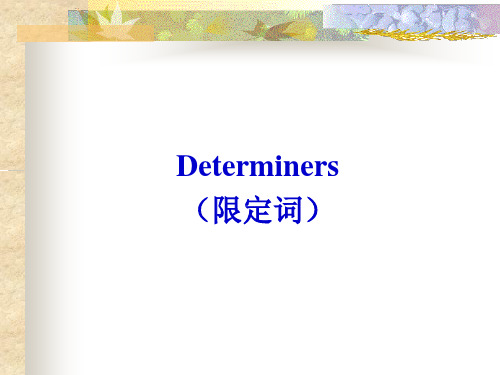
限定词与三类名词的搭配关系
限定词的选择决定于随后的名词类别:单数名词、复数名词, 还是不可数名词。 1) 能与三类名词搭配的限定词 有些限定词如the, some, any, no, other, whose以及my, your等物主 限定词和名词属格(John‘s, my friend’s〕等能与三类名词搭配。 例如: the book, my book, my friend's book, John's book, any book, some book, no book, the other book, whose book the books, my books, my friend's book, John's books, any books, some books, no books, the other books, whose books the money, my money, my friend's money, John's money, any money, some money, no money, the other money, whose money.
限定词与限定词的搭配关系
按照限定词与限定词之间不同搭配位置,限定词可分为前位限 定词(predeterminer) 、中位限定词(central determiner)和后位 限定词(postdeterminer) 。
a)前位限定词包括all, both, half; double, twice, three times, etc; onethird, two-fifths, etc; what, such, (a / an)等
专四语法专题复习:限定词

限定词与三类名词的搭配关系
限定词与限定词的搭配关系
若干限定词用法比较
(1)能与三类名词搭配的限定词
有些限定词如the,some,any,no,other,whose以及my, your等物主限定词和名词属格(John’s,my friend’s)等能与三类 名词搭配。例如: the book the books the money my book my books my money my friend’s book my friend’s boods my friend’s money any book any books any money some book some books some money no book no books no money the other book the other books the other money whose book whose books whose money
个别限定词有跨类现象,如such既属于前位限定 词,又可归入后位限定词。由于它只是在such a ...和 such an …这样的搭配中属于前位限定词,而在与其 他限定词(some,any,no,all,few,another, other,many,one,two等)搭配时,such则是后位 限定词,一律放在上述这些限定词的后面,如some such,any such,no such,few such,one such等,因 此把它归入后位限定词。
(6)能与单数名词和不可数名词搭配的限定词
有些限定词如this,that等能与单数名词和不可数名词搭配。 例如: this/that job this/that work
(7)能与复数名词和不可数名词搭配的限定词
高中英语-限定词
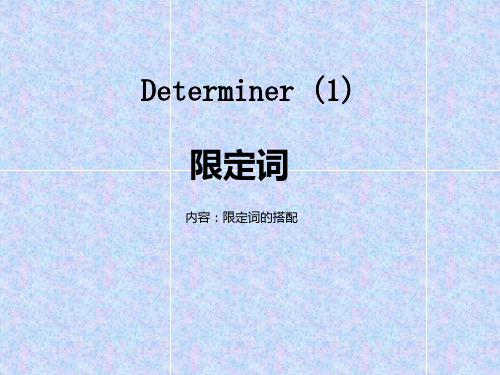
Translate the following into English, using appropriate determiners: 1.开凿隧道需要大量劳动力(labor). 2. 少说空话(empty talk)多干实事(practical work)。 3. 今天参观展览会的人数比昨天少。 4. 安娜(Anna)因为没有足够的钱财而 烦恼丛生。
· There are few things I enjoy more than watching
fish swimming in the stream.
4.只能与不可数名词搭配的限定词
• 有些限定词如:a (little) bit of , a large amount of , a great deal of , (a) little , much less, (the) least等只能与 不可数名词搭配。例如: a bit of water a large amount of money much noise (a) little space less oil (the) least oil · There is little doubt that he and his accomplices are guilty. · The Square was the scene of much fighting in last year’s revolution. ·I can speak a bit of French and understand more .
6.能与单数名词和不可数名词搭配的限定词
有些限定词,如:this , that 等,能与单数名词和 不可数名词搭配。例如: this/that job this/that work · Whoever had come up with this idea deserved a medal. · My family have lived in that village for many generations. · I hope to enjoy that feeling again before long .
限定词(限定形容词,限定动词)的定义及分类

限定词:限定词是在名词词组中对名词中心词起特指、类指以及表示确定数量和非确定数量等限定作用的词类。
名词词组除有词汇意义外,还有其所指意义,是特指(即指特写的对象),还是类指(即泛指一类人或物〕;是有确定的数量,还是没有确定的数量。
能在名词词组中表示这种所指意义的词类就是限定词。
基本简介1、冠词(article)定冠词(DEFINITE ARTICLE),不定冠词(INDEFINITE ARTICLE),零冠词(ZERO ARTICLE)2、形容词性的代词物主限定词(POSSESSIVE PRONOUN DETERMINER),my, your, his, her, our, your, their, one's, its.名词属格(GENITIVE NOUN),John's, my friend's.指示限定词(DEMONSTRATIVE DETERMINER),this, that, these, those, such.关系限定词(RELATIVE DETERMINER),whose, which.疑问限定词(INTERROGATIVE DETERMINER),what, which, whose.不定限定词(INDEFINITE DETERMINER),no, some, any, each, every, enough, either, neither, all, both, half, several, many, much, (a) few, (a) little, other, another.3、数词(numeral)基数词(CARDINAL NUMERAL) 和序数词(ORDINAL NUMERAL)倍数词(MULTIPLICATIVE NUMERAL) 和分数词(FRACTIONAL NUMERAL)4、量词(QUANTIFIER) a lot of, lots of, plenty of, a great of, a good deal of,a large of, a small amount of, a quantity of, a great of, a good n umber of等。
英语中限定词的基本用法介绍
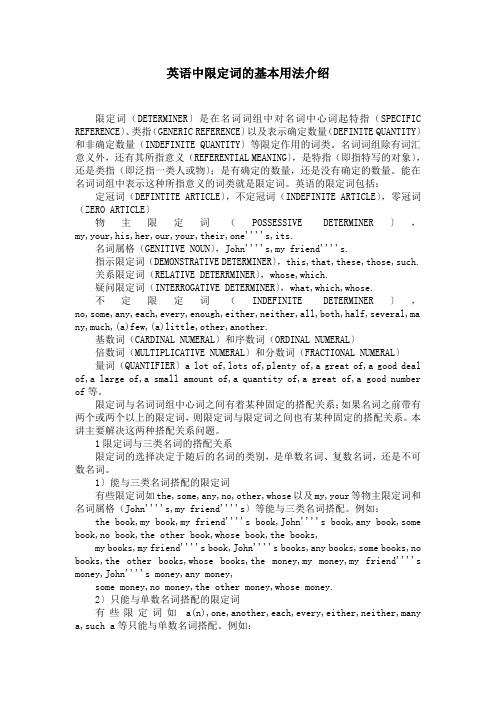
英语中限定词的基本用法介绍限定词(DETERMINER〕是在名词词组中对名词中心词起特指(SPECIFIC REFERENCE〕、类指(GENERIC REFERENCE〕以及表示确定数量(DEFINITE QUANTITY〕和非确定数量(INDEFINITE QUANTITY〕等限定作用的词类。
名词词组除有词汇意义外,还有其所指意义(REFERENTIAL MEANING〕,是特指(即指特写的对象〕,还是类指(即泛指一类人或物〕;是有确定的数量,还是没有确定的数量。
能在名词词组中表示这种所指意义的词类就是限定词。
英语的限定词包括:定冠词(DEFINTITE ARTICLE〕,不定冠词(INDEFINITE ARTICLE〕,零冠词(ZERO ARTICLE〕物主限定词(POSSESSIVE DETERMINER〕,my,your,his,her,our,your,their,one''''s,its.名词属格(GENITIVE NOUN〕,John''''s,my friend''''s.指示限定词(DEMONSTRATIVE DETERMINER〕,this,that,these,those,such.关系限定词(RELATIVE DETERRMINER〕,whose,which.疑问限定词(INTERROGATIVE DETERMINER〕,what,which,whose.不定限定词(INDEFINITE DETERMINER〕,no,some,any,each,every,enough,either,neither,all,both,half,several,ma ny,much,(a)few,(a)little,other,another.基数词(CARDINAL NUMERAL〕和序数词(ORDINAL NUMERAL〕倍数词(MULTIPLICATIVE NUMERAL〕和分数词(FRACTIONAL NUMERAL〕量词(QUANTIFIER〕a lot of,lots of,plenty of,a great of,a good deal of,a large of,a small amount of,a quantity of,a great of,a good number of等。
限定词顺序口诀及解析
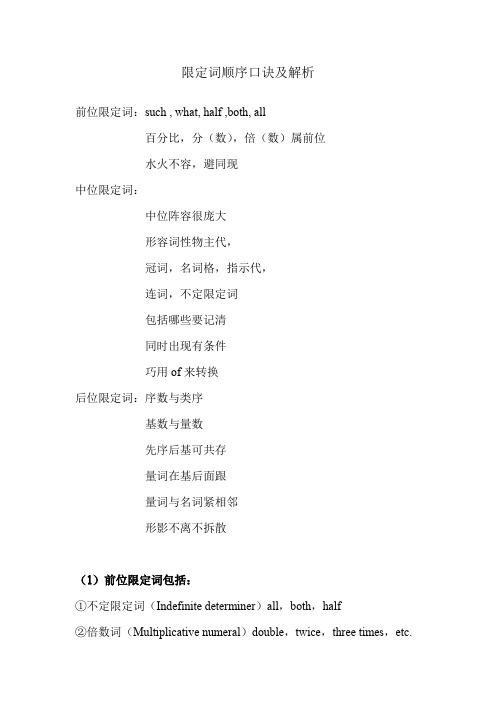
限定词顺序口诀及解析前位限定词:such,what,half,both,all百分比,分(数),倍(数)属前位水火不容,避同现中位限定词:中位阵容很庞大形容词性物主代,冠词,名词格,指示代,连词,不定限定词包括哪些要记清同时出现有条件巧用of来转换后位限定词:序数与类序基数与量数先序后基可共存量词在基后面跟量词与名词紧相邻形影不离不拆散(1)前位限定词包括:①不定限定词(Indefinite determiner)all,both,half②倍数词(Multiplicative numeral)double,twice,three times,etc.③分数词(Fractional numeral)one-third,two-fifths,etc;④what,such,(a/an),etc(2)中位限定词包括:①定冠词(Definite article)the;②不定冠词(Indefinite article)a,an③零冠词(Zero article)④指示限定词(Demonstrative determiner)this,that,these,those⑤物主限定词(Possessive determiner)my,your,his,her,our,your,their,one’s,its⑥名词属格(Genitive noun)Tom’s,my father’s;⑦不定限定词(Indefinite determiner)some,any,no,every,each,either,neither,enough;⑧连接代词what(ever),which(ever),whose,so……that,etc(3)后位限定词包括:①基数词(Cardinal numeral)one,two,three,etc;②序数词(Ordinal numeral)first,second,third,etc;③类序数词next,last,other,another,etc;④量词(Quantifier)many,much,(a)few,(a)little,fewer,(the)fewest,less,(the)least,more,most;several,plenty of,a lot of,lots of,a great/large/good number of,a great/good deal of,a large/small amount of;⑤such,etc限定词之间的搭配顺序:前+中+后根据限定词在名词前的位置关系,即如果一个名词词组带有上述三类限定词,其搭配关系总是按照前位词放在第一位,中位限定词放在第二位,接着是后位限定词,即按“前位—中位—后位”的顺序排列。
大学英语限定词经典解读
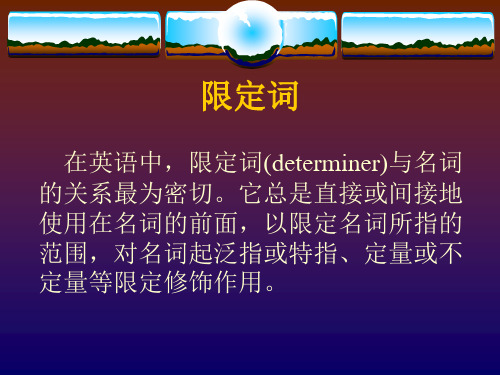
2、不定限定词a few, few, a little, little
很多, 没多少 有一些 许多 (否定) (肯定) 用于可数名词
用于不可数名词
many
much
few
little
a few
a little
⑴ 与名词搭配 a few, few后面只能接可数名词复数;而a little, little后面只能接不可数名词
other本身的其他用法
1) other之前可以有其他限定词修饰。如:some, any, every, one/two/three, no, many, his/my/their… ①Can you give me some other reference books? ②every other day ③no other tools ④Have you got any other colors? 2)other/the other: “other+名词”表不确定的“其他 的…,另外的…”;“the other+名词”表特定的“剩下 其余的…”。 ①Some metals are magnetic and other metals are not. ②Of all metals, only mercury is liquid and the other metals are solid. 3)other/others: other只能作限定词来用,后面必须接名 词,不能说:Other are…;与此相反,others只能用作
4. 不定限定词 another, other
⑴ 从与名词搭配来看,another只能与单数可数 名词连用,表示不确定的“另一个”、“再 一个”。如another day,而不说another days, another water(可以说another cup of water)。 然而,other可与单数或复数可数名词以及不可 数名词连用,表示不确定的“另外的”、 “其余的”人或物。如other boys, the other boy(s), other fish。
大学英语语法之限定词

是:年龄,形状,大小+颜色+来源+质地+用途+国家+
名词。
精选课件
10
3) ---- How was your recent visit to Qingdao? ---- It was great. We visited some friends,and
spent the ___days at the seaside.
有的学者把出现在不定冠词之前的quite 和
rather 也归入前位限定精选词课件
2
中位限定词(Central determiners) 包含下列词:
定冠词:a(an),the ,zero;
指示词:this / that / these / those ;
形容词性物主代词,名词所有格:my ,your, his ,her ; John's; 不定限定词(量词):some, any, no, every, each, either, neither, enough, much等 疑问限定词:即wh-words :what(ever), which (ever), whose等。
由由限定词限定词数词数词描绘词描绘词大小长短大小长短形状新旧颜色形状新旧颜色性质性质名词名词的公式可知数词描的公式可知数词描绘词性质依次顺序
限定词与限定词的搭配关系
在名词词组中心词之前如果有 两个或两个以上限定词出现时,就 会产生限定词的先后顺序问题。
精选课件
1
前位,中位,后位限定 前位限定词(Pr词edeterminer):all, both, half,
精选课件
11
2 .( 2004 年浙江卷 24 题) ______ students are required to take part in the boat race. A. Ten strong young Chinese B. Ten Chinese strong young C. Chinese ten young strong D. Young strong ten Chinese
- 1、下载文档前请自行甄别文档内容的完整性,平台不提供额外的编辑、内容补充、找答案等附加服务。
- 2、"仅部分预览"的文档,不可在线预览部分如存在完整性等问题,可反馈申请退款(可完整预览的文档不适用该条件!)。
- 3、如文档侵犯您的权益,请联系客服反馈,我们会尽快为您处理(人工客服工作时间:9:00-18:30)。
第十四章限定词一、限定词概述定词是与名词密切相关的词类,包括冠词(a(n),the)、形容词性指示代词(this,that,these,those)、形容词性物主代词(my,your,our,etc.)、形容词性不定代词(both,every,much,some,etc.)、数词(one,two,etc;first,second,etc.;one-third,three-fifths,etc.)和特指形容词(next,only,etc.)。
限定词用于名词的前面,限定名词所指的范围,表示该名词是特指还是泛指,是定量还是不定量。
限定词的使用并非随意,受着名词种类及形式的制约,与名词有着特定的搭配关系,在多个限定词连用时相互之间还有着相对固定的位置二、限定词与名词的搭配关系限定词一般不用于专有名词,用于普通名词时要根据名词的数和类别来决定。
普通名词可分为如下三类:单数可数名词,如:a desk, a pencil等。
复数可数名词,如:desks, pencils等。
不可数名词,如:coffee, fire等。
各限定词与三类名词搭配关系可分为以下几种情况:A. 能与三类名词搭配的限定词定冠词the, 如:the book, the books, the bread等。
物主代词、名词所有格,如:my / John's bookmy / John's booksmy / John's breadall / some / any / no,如:all / some / any / no bookall / some / any / no booksall / some / any / no breadother / such,如:other / such studentother / such studentswh -words (eg. what, which, whose等)。
I'm sorry you had such terrible weather.Which John do you mean, John the baker or John the post man?Note:such经常与不定冠词连用构成such + a(n) + adj + 名词结构。
如:I've never lived in such a large house as this before.They haven't had such a good time for ages.B. 只能与单数可数名词搭配的限定词如:a (n), each, every, either, one等。
I told every student to come.She knows every pupil of the class.You may use either hoe.C. 只能与复数可数名词搭配的限定词如:both, (a) few, several, these / those, a (great) number of, two / three, many等。
We're asking a few friends round to dinner.A great number of animals are killed every year.Note:many后面可以跟a (n)放在单数可数名词前,尽管还表示“许多”的意思,但动词用单数。
Many a man is going to welcome the foreign guests.Many a friend has been invited to this party.D. 只能与不可数名词搭配的限定词如:(a) little, a bit of, a great amount of, a great deal of, much 等。
In fact I know a bit of Spanish.A large amount of money is spent on tobacco every year.E. 能与单数可数名词和复数可数名词搭配的限定词如:the first / second, the next, the other 等。
What's the next thing to do?John wanted to know what the other doctors suggest.F. 能与复数可数名词和不可数名词搭配的限定词如:a lot of, plenty of, lots of, enough, more, most等。
There is enough food for everybody.There aren't enough tools to go around.G. 能与单数可数名词和不可数名词搭配的限定词如:(the) least, this, that等。
He hadn't the least thought of his own interests.She fainted at the least sight of blood.三、限定词与限定词的搭配关系在名词词组中,当两个以上的限定词同时出现时,限定词之间就存在前后顺序问题,根据限定词不同的搭配位置,限定词可分为中位限定词、前位限定词和后位限定词。
前位限定词(Predeterminers):all, both, half, double, twice; one third, two thirds等。
中位限定词(Central determiners )包括:冠词;指示词(this / that / these / those) ;形容词性物主代词,名词所有格(my, John's);量词(some, any, no, every, each, either, neither, enough, much等);wh-words (what, which, whose等)。
后位限定词(Postdeterminers):基数词;序数词; last, next, other, another等; such; many, little, few, several, more, less等。
The teacher asked his students to write their answers on every othe r line.老师要求学生隔一行写出答案。
Both my brothers have graduated from universities.我两个兄弟都大学毕业了。
The old men had a very good time during all these last few days.这些老人在最后一段日子里过得很愉快。
在限定词的搭配中,一般的顺序都是前位-中位-后位,中位限定词之间和前位限定词之间是互相排斥的,即:两个中位限定词或两个前位限定词不能同时修饰中心词-名词,而后位限定词则可以并列修饰中心词。
Mr Harrison showed us a few more samples.T om broke his leg on New Year's day. It took him the next few weeks to get over it.汤姆新年那天摔断了腿,几个星期后才恢复。
The girl's parents invited several hundred guests to her birthday party.女孩的父母邀请了几百名客人参加她的生日晚会。
Note:限定词使用规则:限定词的分类比较复杂、难记。
一般情况下,可以运用以下几条简单、实用的规则。
A.把all和both放在其他限定词之前。
如:The little boy ate all the food.All such problems should be considered.Both my hands were seriously hurt.B.把many / much, more / most, few / little放在其他限定词之后。
如:His many successes made him famous.John's few friends speak highly of him.With the surrender of the enemy troops, no more fighting was expected there.C.感叹句中,把what和such放在a(n)之前。
如:What a lovely girl!I've never seen such a crowd!四、几组限定词的用法比较(一)some, any, no的用法some, any, no同是能与单数可数名词、复数可数名词和不可数名词搭配的限定词。
1.some和any表示“一些,若干几分”等含义,一般情况下,some用于肯定句,any用于疑问、否定、条件句中。
Have you got any aspirins?Mr White has some flowers in his garden.We haven't invited any students to the party.If you want any glasses, I'll send you some.2.any 还可以用于实际上含否定意思的肯定句中。
例如,含有never, without, hardly等词的肯定句。
The young accountant seldom makes any error in his books.I can answer your questions without any hesitations.The noise of the party prevented me from getting any sleep.3.some可以与others连用。
Some people like the sea, others prefer the mountains.Some students answered Yes and others answered No.4.如果说话人预期肯定回答时,some也可用于疑问句。
Don't you give him some tickets?"I've just been shopping." "Oh, did you buy some rice?”some还可用在表示劝请、请求、命令的疑问句中。
